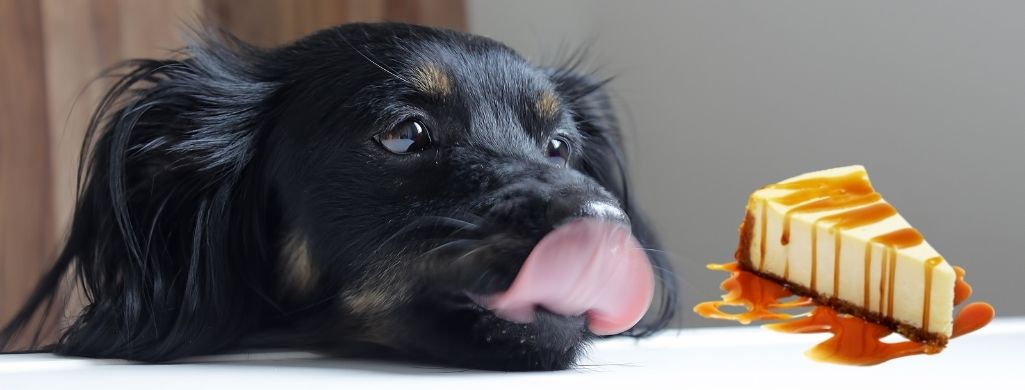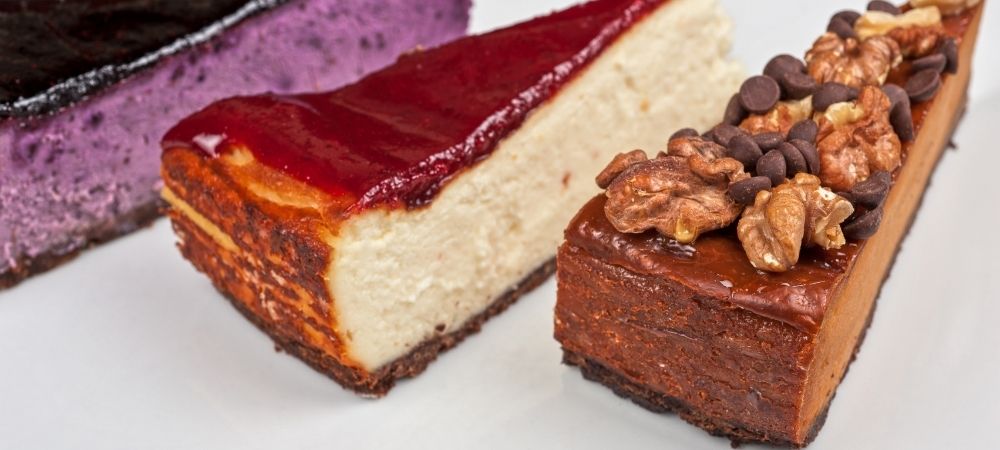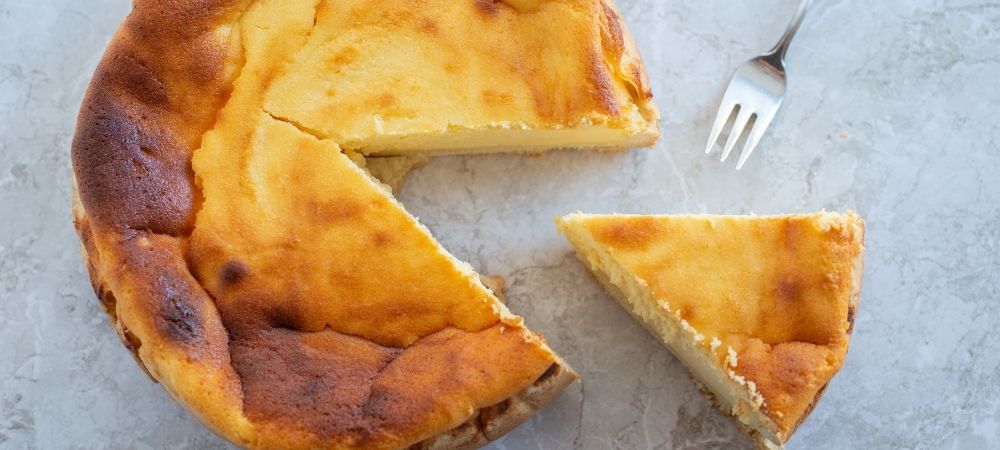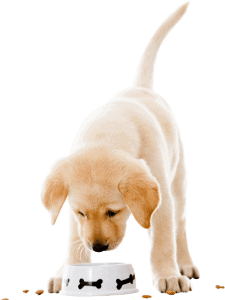
Dogs love cream cheese and delicious treats! But can dogs eat cheesecake?
Before you give your dog some food they shouldn’t be eating (especially if they have a sensitive stomach), read what happens when a dog eats cheesecake!
Can Dogs Eat Cheesecake?
Yes, in theory, dogs can eat cheesecake. However, that doesn’t mean they should. There are several reasons why giving dogs cheesecake isn’t a very good idea.
Is Cheesecake Bad for Dogs?
Cheesecake isn’t bad for dogs in the sense of being poisonous. However, several ingredients can hurt their digestive system if too much is consumed.
Cream cheese and dairy products are hard to digest for many dogs, but even more so when they’re in an altered form like cheesecake. Extra fat in cream cheese won’t be doing your dog any favors.
Also, dogs have a harder time digesting sugars than we do. Giving them a dessert that is very high in sugar may cause an upset stomach.
Finally, many cheesecakes are made with chocolate or other things that dogs should never eat. Some also have raisins and nuts, which can be toxic to dogs even in small amounts. Both of these types are highly poisonous to dogs.

What Ingredients Are in a Cheesecake?
The majority of cheesecakes have the same basic ingredients. You should know which ones are bad for your dog.
Cheese and Dairy Products
Cream cheese and dairy are the primary ingredients in cheesecake. When dogs eat cheesecake, these can be harmful, especially to lactose-intolerant dogs.
Dairy products can produce the following symptoms:
- Bloating
- Dehydration
- Lethargy
- Vomiting
- Abdominal pain
- Diarrhea
- Gas
Cream cheese and cream also have high fat content. Frequent ingestion of high fat in cream cheese and dairy can cause more serious symptoms and diseases:
- Sluggishness
- Weight gain
- Heart disease
- Digestion problems
- Diabetes
- Pancreatitis
Sugar
Many cheesecakes contain a lot of sugar. Too much sugar can lead to:
- Weight gain
- Diabetes
- Obesity
- Poor digestion
Sugar is also bad for dogs because it promotes yeast growth in their mouth and body. This can cause:
- Bad breath
- Skin problems
- Diarrhea,
- Vomiting
Digestive Cookies
Some brands of cheesecake contain digestive cookies. These are often used as a topping or ingredient in the cheesecake itself. Digestive cookies are made with salt, butter, flour, sugar, eggs, baking soda, and cream.
This is generally safe for dogs to eat because it’s mostly natural ingredients without harmful components like chocolate or raisins.
There is little concern regarding toxic substances digestive cookies might have. But, bear in mind that these cookies still have fat and butter.
Other Additives
Vanilla essence, chocolate, lemon, coffee, cinnamon, macadamia nuts, and raisins are common ingredients in cheesecake. All of these can make your dog severely ill.
Additionally, xylitol could be used as a sweetener in some recipes. Always check the ingredients. Xylitol is extremely toxic to dogs.
When Shouldn’t You Feed Cheesecake to Your Dog?
There are a few instances when feeding your canine cheesecake is not recommended.
Dogs With Diabetes
Cheesecakes tend to be very heavy on sugar content. This can cause the dog’s blood glucose levels to go too high or too low. If you have a diabetic dog, it’s best not to feed them any dessert because they’re already at risk for fluctuations in glucose.
Dogs With Allergies
Dogs can be intolerant to many ingredients, including:
- Cheese
- Dairy products
- Sugar
If your dog has a little cheesecake and starts having a physiological reaction (diarrhea, vomiting), it’s best to take them to the vet.
Dogs with Lactose Intolerance
Some dogs have lactose intolerance. Puppies can develop it because their digestive system hasn’t fully developed yet.
Adult dogs can become lactose-intolerant for various reasons (pancreatitis, other diseases, natural decrease in lactase production). If your dog is lactose-intolerant, feeding them cheesecake can result in vomiting and diarrhea.
Dogs with a Small Daily Caloric Intake
Cheesecakes are usually very high in fat and sugar content. It would be best if you fed your dog treats that have moderate amounts of these ingredients. Giving large amounts of cream cheese, for example, can cause weight gain, obesity, and hyperactivity.
Feeding little dogs a lot of cheesecake can quickly add up to dangerously high levels of fat and sugar.
Dogs With an Upset Stomach
If your dog’s stomach is already upset, any new food you introduce can cause a problem.
Cheesecakes often have many ingredients that a dog’s digestive system may not be used to. Your dog could get diarrhea from the high dairy content. Feeding your dog cheesecake and sugary treats will further aggravate their stomachs, which is especially bad if they’re already dehydrated.

Can Dogs Eat Raisin Cheesecake?
Raisins can be toxic to dogs. There is no safe amount of grapes or raisins for dogs to ingest. Even if it’s just a few, it could make them very sick. The same goes for fresh grapes.
The smallest quantities of these can bring about loss of appetite, stomachache, weakness, dehydration, excessive urination, and kidney failure.
Can Dogs Eat Chocolate Cheesecake?
Chocolate is a big no-no for dogs. Chocolate contains caffeine and theobromine, two toxic substances to canines.
The darker the chocolate, the more dangerous it is. The following are just some of the symptoms that may occur if your dog eats chocolate:
- Hyperactivity
- Nausea, vomiting, and diarrhea
- Increased urination
- Muscle spasms
- Anxiety
- Tremors
If you fed your dog cheesecake with chocolate, and these symptoms occur, take them to the vet immediately. You can also check the chocolate toxicity calculator for dogs.
Can Dogs Eat Cheesecake With Nuts?
Some of the most popular ingredients in a cheesecake are:
- Almonds
- Walnuts
- Macadamia nuts
- Pistachios
These nuts sound innocent enough, but they can actually be very dangerous for your dog to ingest. Nuts contain high amounts of oils. When these oils aren’t metabolized correctly, they can cause pancreatitis.
Pecan pie cheesecake is especially dangerous for dogs because of the high amounts of pecans it contains. Pecans are highly toxic to dogs.
Feeding your dog any kind of nut cheesecake can lead to vomiting, diarrhea, loss of appetite, increased water intake and urination, pancreatitis, and kidney failure.
Can Dogs Eat Cheesecake Without Nuts?
Many cheesecakes use ricotta cheese, cottage cheese, or creme in place of nuts. These cheesecakes tend to be safe(r) for dogs. You should always pay attention when feeding your dog any kind of cake because they could have a bad reaction.
Can Dogs Eat Blueberry Cheesecake?
Blueberries are perfectly safe for dogs. They’re great antioxidants and can boost a dog’s health. If your dog likes blueberries, go ahead and feed them one or two.
But, a blueberry cheesecake is another story. Don’t feed it to your dog because of the high fat and sugar content, and dairy.
Can Dogs Eat Pumpkin Cheesecake?
Pumpkin is safe and beneficial for dogs, but pumpkin cheesecake is not. Cheesecakes are usually very high in fat and sugar content. The average slice of pumpkin cheesecake contains over 250 calories which can be dangerous for your dog’s weight.
Pumpkin cheesecakes use heavy cream, which can cause your dog to have an upset stomach, diarrhea, or even pancreatitis.
If you want to give your dog a treat that’s safe for them and tastes great, try giving them some pumpkin puree spread over their kibble. It’ll give the food a little extra flavor without making them sick.
Can Dogs Eat Cheesecake Crust?
A cheesecake crust is usually made from digestive cookies, graham crackers, or even cake sponge. They’re pretty safe to eat for humans, and they typically are ok for dogs, too.
However, a lot of sugar and butter goes into making these types of crusts. If your dog ate cheesecake crust, it could make your four-legged friend quite sick.

What if My Dog Eats Cheesecake?
If your dog accidentally eats a cheesecake, it probably won’t make them sick. The cream and other dairy products can cause some minor issues for lactose-intolerant adult dogs, but nothing serious. The effects will depend on the type of cheesecake.
However, if you see your pup eating any part of the cake or have reason to believe that they’ve eaten the whole thing, take them to the vet immediately.
Symptoms of chocolate poisoning are:
- Vomiting
- Diarrhea
- Muscle spasms
- Increased urination
- Seizures
- Loss of appetite
Symptoms of grape or raisin poisoning include:
- Somachache
- Weakness
- Dehydration
- Excessive urination
- Shaking and muscle tremors
If you suspect your dog ate cheesecake, and notice these symptoms, take your dog to the vet clinic immediately.
Your Dog Ate Cheesecake, But How Much?
If your dog ate only a tiny bite of cheesecake, it’s unlikely anything bad will occur.
However, suppose the dog ate a few slices of cheesecake. In that case, it’s best to seek immediate veterinary assistance.
The worst-case scenario? If your dog ate a few slices of chocolate, raisin, or nut cheesecake. Don’t wait; take your dog to the vet clinic as quickly as possible.
Safe Alternatives to Cheesecake
Giving your dog a sweet treat is fun every once in a while, but it’s not good for them.
Give them some fruits and vegetables instead, like:
- Goji berries
- Pumpkin
- Fruit yogurt
- Cottage cheese
- Peanut butter
- Apples
- Carrots
- Blueberries
Your pooch will enjoy them just the same, and you won’t have to fear for their health.
How Can You Make Cheesecake for Your Dog?
You can make a yummy cheesecake that is also safe for your doggy. Simply switch cream cheese and dairy for some yogurt or cottage cheese.
Nuts, raisins, and chocolate are some of the most dangerous ingredients for your dog. Make sure cheesecake for dogs doesn’t include any of these. Instead, use mashed fruits, peanut butter, or mashed pumpkin.
Don’t overdo it, though; dogs sometimes love these so much that there were instances where they refused their regular food afterward.
Say Cheese!
Dogs are often treated like family, but that doesn’t mean they should be given human foods.
Cheesecake is not only bad for your dog’s waistline —t it can also lead to an upset stomach, pancreatitis, or worse. If you want a safe alternative, try giving them fruits and vegetables instead.
Better yet, make your own doggy-safe dessert! With minimal ingredients needed, you won’t have to worry about their health while getting the satisfaction of seeing them enjoy their treat too.
FAQ
Can dogs lick cream cheese?
Dogs can eat cream cheese but in very small portions, and if the dog is not lactose-intolerant. Cream cheese is high in fat and over time can lead to obesity and other health problems.
Can cream cheese upset a dog’s stomach?
Dairy products can cause digestive issues, especially for lactose intolerant dogs. A bit of cream cheese won’t hurt your dog, but don’t give it as a treat.
Can dogs eat strawberry cheesecake?
Dogs can eat strawberry cheesecake in moderation and only occasionally. Strawberries are rich in vitamin C, but they are also very high in sugar. It’s always better to give fresh strawberries, though.

